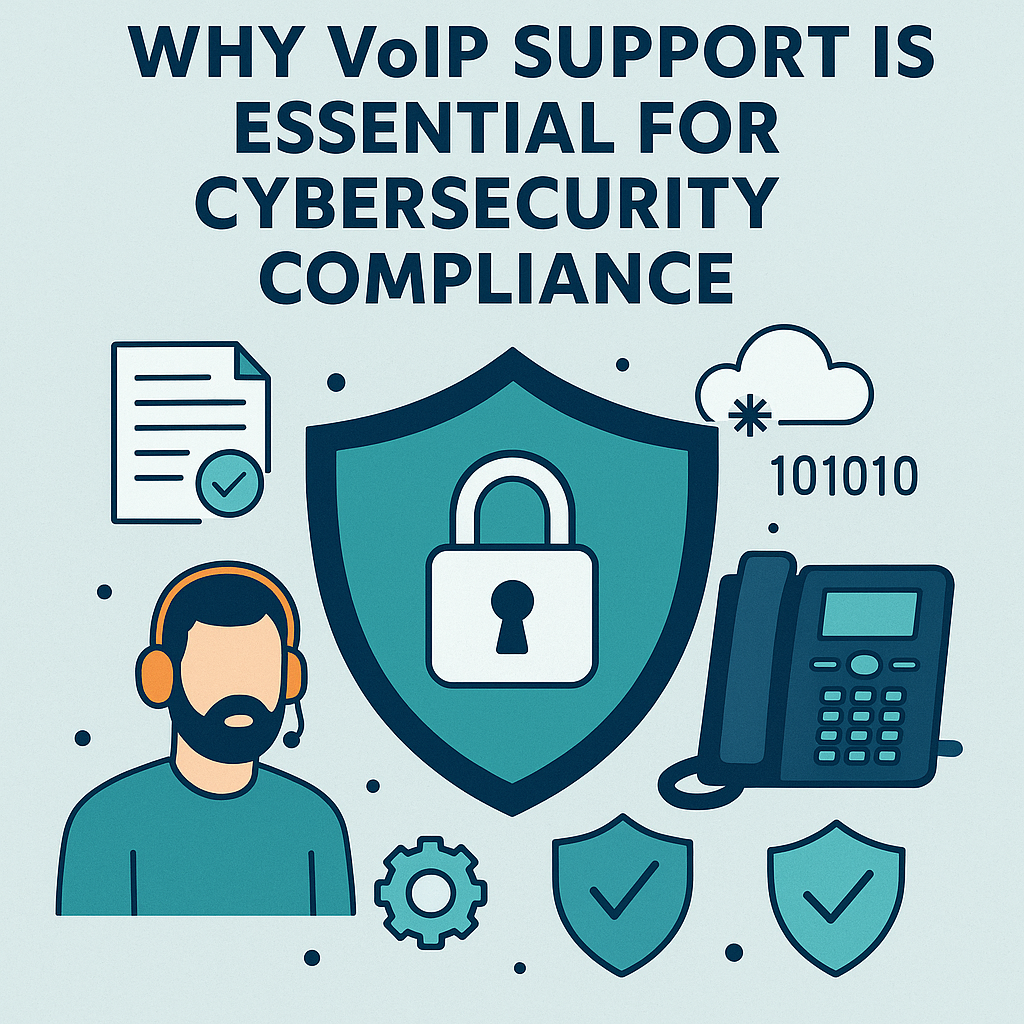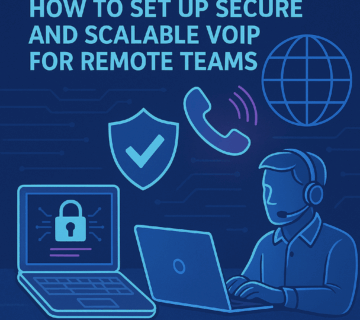The Role of 24/7 VoIP Support in Business Continuity Planning
Introduction to Business Continuity Planning (BCP)
Business Continuity Planning (BCP) is an essential strategy for organizations to maintain operations in the face of unexpected disruptions. From cyber threats to natural disasters, having a continuity plan ensures that businesses can serve customers, protect data, and sustain communications.
Today, effective BCP goes beyond backups and disaster recovery—it includes strategic communications, especially using VoIP services business solutions with reliable professional server support.
VoIP Technology and Its Business Applications
Voice over Internet Protocol (VoIP) has evolved into an indispensable tool for businesses, replacing traditional phone systems with agile, scalable communication solutions. These platforms handle voice calls over the internet, offering cost savings, mobility, and enhanced functionality.
Key advantages include:
- Integration with CRMs and helpdesk systems
- Unified messaging across channels
- Scalability with minimal infrastructure
Leading top enterprise VoIP providers ensure advanced call handling, remote access, analytics, and cloud integration. VoIP systems also double as voip solutions for remote teams, offering seamless communication for distributed workforces.
The Critical Importance of 24/7 Support in VoIP Systems
Having a powerful VoIP system is not enough—24/7 VoIP support is vital to protect against system failures, cyberattacks, and network downtime.
Benefits of 24/7 support:
- Professional server support ensures real-time monitoring and issue resolution
- Around-the-clock diagnostics to prevent service degradation
- Assistance with patches, updates, and integrations
Businesses seeking the best VoIP for remote workers prioritize providers offering constant technical support to maintain smooth operations, no matter the hour.
How VoIP Supports Business Continuity
VoIP’s cloud-based nature is a game-changer for business continuity. With data stored across multiple secure data centers, businesses can continue operations even if one server fails.
Key BCP advantages of VoIP:
- Failover routing during internet outages
- Device-independent access from smartphones or desktops
- Automatic backups and encrypted communication
These features are vital for businesses that prioritize resilience and flexibility, particularly those relying on VoIP solutions for remote teams.
Key Features of VoIP That Enhance BCP
When supported by top business VoIP providers, these features offer unmatched reliability:
- Auto-attendant: Ensures customers are greeted and routed correctly during any disruption.
- Call forwarding and mobile sync: Maintains call flow, even if offices are inaccessible.
- Voicemail-to-email: Guarantees important messages are never missed.
- Desktop integration: VoIP softphones enable calling from workstations with no additional hardware.
Combined with professional server support, these features ensure smooth operation even during technical emergencies.
Risk Management with 24/7 VoIP Support
VoIP systems can be targets for cyber threats or suffer from power or bandwidth limitations. With 24/7 support, businesses gain:
- Immediate detection of intrusions
- Prompt response to DDoS attacks
- Continuous performance tuning
- Secure handling of sensitive calls, aligned with HIPAA and GDPR standards
These capabilities, paired with essential tools for IT technicians, allow swift incident management and risk mitigation.
Case Studies: Businesses Saved by 24/7 VoIP Support
Case Study 1: A healthcare firm faced a ransomware attack that encrypted on-premises data. Fortunately, they used a top business VoIP provider with 24/7 support and remote backups. Communication services were restored in under two hours.
Case Study 2: A financial services firm experienced a regional power outage. Thanks to their VoIP system’s cloud routing, calls were forwarded to remote teams using the best VoIP for remote workers, and operations remained unaffected.
Cost-Efficiency and ROI of 24/7 VoIP Support in BCP
VoIP reduces:
- Long-distance calling costs
- Maintenance of traditional infrastructure
- Physical server and hardware overhead
With professional server support, businesses avoid downtime that leads to lost revenue. Also, pricing models offered by top enterprise VoIP providers are often flexible, supporting pay-as-you-go or scalable tiers.
Choosing the Right VoIP Provider for Business Continuity
When evaluating VoIP services business options, look for:
- Redundant infrastructure
- SLAs with uptime guarantees of 99.99%
- Responsive 24/7 technical support
- Compliance certifications
Top enterprise VoIP providers also offer built-in disaster recovery, automatic rerouting, and geo-redundant servers, ensuring consistent service even in adverse conditions.
Integrating VoIP Support into Existing Continuity Plans
Steps to integrate VoIP into BCP:
- Audit current telephony systems
- Identify vulnerabilities and call dependencies
- Consult with a top business VoIP provider
- Deploy professional server support and monitoring tools
- Incorporate VoIP into incident response protocols
Organizations must ensure that their VoIP systems are aligned with the rest of their continuity and recovery strategies.
Employee Training and VoIP Readiness
Even the best VoIP systems require knowledgeable users. Training staff—especially those working remotely—is vital.
Encourage IT staff to pursue desktop support technician certification and gain hands-on experience with:
- VoIP configuration
- Emergency rerouting
- Basic troubleshooting using essential tools for IT technicians
Simulated outage scenarios should be run regularly to test system resilience and employee preparedness.
Monitoring, Reporting, and Improvement Cycles
Continuous monitoring through analytics is crucial to identify performance gaps.
Use dashboards to track:
- Call latency and jitter
- Packet loss
- Uptime vs SLA compliance
Reports help refine continuity plans and benchmark improvements over time. Professional server support includes periodic reviews and SLA adjustments.
Future-Proofing Business with Scalable VoIP Solutions
VoIP evolves with your business. It scales easily with:
- New employee onboarding
- Department expansions
- Mergers and acquisitions
Hybrid and remote work setups benefit most from voip solutions for remote teams, enabling global communication through secure and manageable platforms.
Regulatory Compliance and VoIP Business Continuity
VoIP systems must adhere to:
- HIPAA (Healthcare)
- GDPR (European Union)
- PCI-DSS (Financial Data)
Top business VoIP providers build compliance features into their services. Features like encrypted voice traffic, call logging, and retention policies help businesses meet legal obligations without sacrificing communication quality.
Common Challenges and How 24/7 Support Solves Them
| Challenge | Solution with 24/7 VoIP Support |
| Network disruption | Failover routing via secondary ISP |
| Cyber threats | Intrusion detection + real-time alerts |
| Hardware failures | Automatic rerouting to softphones |
| Human error | Instant rollback + guided recovery |
These solutions help ensure continuity, especially when powered by professional server support and essential tools for IT technicians.
Conclusion
The modern business environment demands resilience. Integrating VoIP into your continuity plan, especially from top enterprise VoIP providers with 24/7 support, is no longer optional—it’s essential.
With tools designed for hybrid work, secure infrastructure, and professional server support, VoIP systems ensure that your organization remains agile, connected, and ready—no matter what challenges arise.
FAQs About The Role of 24/7 VoIP Support in Business Continuity Planning
Q1: Why is VoIP important for business continuity planning?
VoIP ensures uninterrupted communication during disruptions, especially for remote or hybrid teams. It’s flexible, secure, and backed by cloud technology.
Q2: What are the benefits of 24/7 VoIP support?
You get real-time issue resolution, proactive system monitoring, and full-time availability—minimizing downtime and enhancing communication reliability.
Q3: How does professional server support enhance VoIP reliability?
It ensures that VoIP servers are constantly monitored, patched, and optimized. This guarantees uptime and quick recovery from technical issues.
Q4: Which is the best VoIP for remote workers?
Look for solutions that offer mobile integration, secure login, call forwarding, and cloud syncing—features offered by top business VoIP providers.
Q5: Can VoIP systems help with compliance?
Yes. Advanced VoIP services offer features for secure data transmission, call recording, and storage—aligned with HIPAA, GDPR, and PCI standards.
Q6: Do IT technicians need special training to manage VoIP?
While not mandatory, having a desktop support technician certification and using essential tools for IT technicians greatly improves efficiency and problem-solving during crises.





No comment